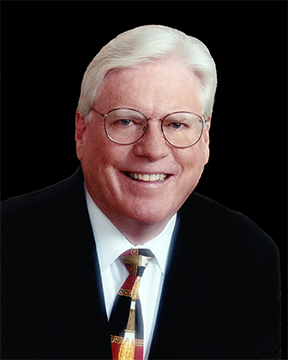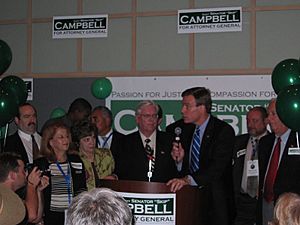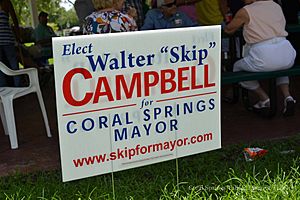Skip Campbell facts for kids
Quick facts for kids
Skip Campbell
|
|
|---|---|
 |
|
| Mayor of Coral Springs | |
| In office November 14, 2014 – October 23, 2018 |
|
| Preceded by | Vincent Boccard |
| Succeeded by | Lou Cimaglia (Acting) |
| Member of the Florida Senate from the 32nd district |
|
| In office November 19, 2002 – November 21, 2006 |
|
| Preceded by | Debbie Wasserman Schultz |
| Succeeded by | Jeremy Ring |
| Member of the Florida Senate from the 33rd district |
|
| In office November 19, 1996 – November 19, 2002 |
|
| Preceded by | Peter Weinstein |
| Succeeded by | Frederica Wilson |
| Personal details | |
| Born | November 12, 1948 Rockaway Beach, New York, U.S. |
| Died | October 23, 2018 (aged 69) Coral Springs, Florida, U.S. |
| Political party | Democratic |
| Spouse | Lynn Satin |
| Alma mater | University of Florida (B.A.) Fredric G. Levin College of Law (J.D.) |
| Profession | Attorney |
Walter G. "Skip" Campbell Jr. (November 12, 1948 – October 23, 2018) was an American politician. He was a member of the Democratic Party. Skip Campbell served as a member of the Florida Senate from 1996 to 2006. Later, he became the Mayor of Coral Springs, Florida, serving from 2014 until his death.
Contents
Early Life and Career
Skip Campbell was born in Rockaway Beach, New York, in 1948. He moved to Florida in 1961. He went to St. John Vianney College Seminary and earned his associate degree. Then, he attended the University of Florida. He received his bachelor's degree in 1970 and his law degree (Juris Doctor) in 1973.
In 1975, Campbell started a law firm with Jon Krupnick. It was first called Krupnick & Campbell. Later, its name changed to Krupnick Campbell Malone Buser Slama Hancock Liberman. He also taught law at the Shepard Broad Law Center. He was the President of the Broward County Bar Association. He also served on the Florida Election Commission. As a lawyer, he helped people with various legal issues. For example, he worked on cases that led to safer car designs.
Serving in the Florida Senate
First Election for State Senator
In 1996, the current State Senator, Peter Weinstein, decided not to run again. He wanted to run for Congress instead. Skip Campbell decided to run for his seat in the 33rd District. This area included parts of northwestern Broward County.
Campbell ran against Steven Feren in the Democratic primary election. Both candidates wanted to improve public education. They also focused on preventing crime and changing property insurance rules. Campbell said Feren did not live in the district. He also said Feren had not done much in the Florida House. Feren, on the other hand, said Campbell was out of touch because he was wealthy.
The Sun-Sentinel newspaper supported Campbell. They praised his leadership skills. Campbell won the primary election with 59% of the votes. Feren received 41%.
General Election and Re-elections
After winning the primary, Campbell faced Frank Virella, a Republican. Campbell talked about solving school overcrowding. He also wanted to fix the state's insurance system and juvenile justice. Virella focused on having less government control. The Sun-Sentinel again supported Campbell. They believed he would represent his community well. Campbell won the election easily. He received 68% of the votes, while Virella got 32%.
In 2000, Campbell was re-elected without anyone running against him. In 2002, the district lines changed. Campbell ran for re-election in the 32nd District. This new district included many areas he had represented before. These included Coral Springs, Margate, Parkland, Sunrise, and Tamarac. He was re-elected for his third and final term without opposition.
Running for Attorney General

In 2006, Skip Campbell could not run for the State Senate again. This was because of term limits. He announced in 2005 that he would run for Attorney General of Florida. The Attorney General is the state's chief legal officer. Campbell said his experience as a lawyer would help him. He promised to take action against gas companies for unfair pricing after Hurricane Katrina.
He faced Merrilee Ehrlich in the Democratic primary. Campbell won this primary election easily. He received 65% of the votes, and Ehrlich got 35%.
In the main election, Campbell ran against Bill McCollum, a former U.S. Congressman. Campbell presented himself as a moderate Democrat. He highlighted his experience working with Republicans in the State Senate. Campbell wanted to reduce delays in the state's court system. He suggested hiring more lawyers and creating programs to help people before trial. McCollum, however, wanted to limit lawsuits.
Newspapers like the Sarasota Herald-Tribune and the Tallahassee Democrat supported Campbell. They praised his knowledge of state issues and his ability to work with both parties. However, McCollum won the election. He received 53% of the votes, while Campbell got 47%.
Later Political Campaigns
After his run for Attorney General, Campbell considered challenging Republican State Senator Jeff Atwater in 2008. This district covered parts of Broward and Palm Beach counties. Campbell said he wanted to change the "pay-to-play culture" in the legislature. He also felt Atwater was too close to insurance companies.
This race was expected to be very close. However, Campbell had to drop out. This was due to a negative reaction from a hip surgery. In 2010, when Atwater left his seat, Campbell thought about running again but decided not to.
Mayor of Coral Springs
In 2014, Skip Campbell announced he would run for Mayor of Coral Springs. He had considered running for the State Senate again in 2016. As mayor, he wanted to make city spending a top priority. He criticized a $70,000 city branding campaign. He also questioned a plan to build a new City Hall that would cost $28 million.
He ran against Coral Springs Commissioner Tom Powers. Powers supported building a downtown area. Campbell disagreed, saying the city should spend its money wisely instead. Campbell talked about his experience with the Coral Springs Economic Development Foundation. He promised to attract businesses and hire more police officers. Campbell won the election against Powers. He was re-elected in November 2016. At the time of his death, he was running for re-election in 2018 and had no opponents.
Death
Skip Campbell passed away on October 23, 2018, at the age of 69. He was recovering from a hip operation at the time.
 | William Lucy |
 | Charles Hayes |
 | Cleveland Robinson |


